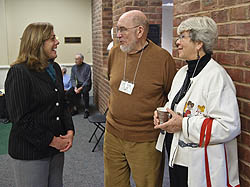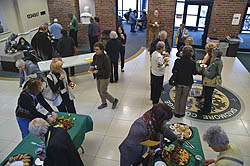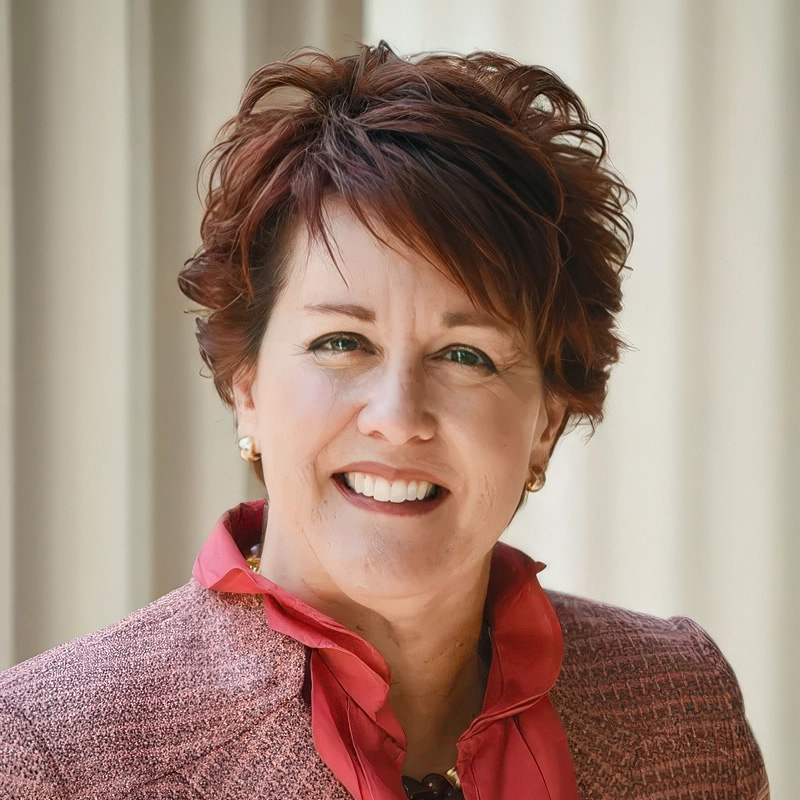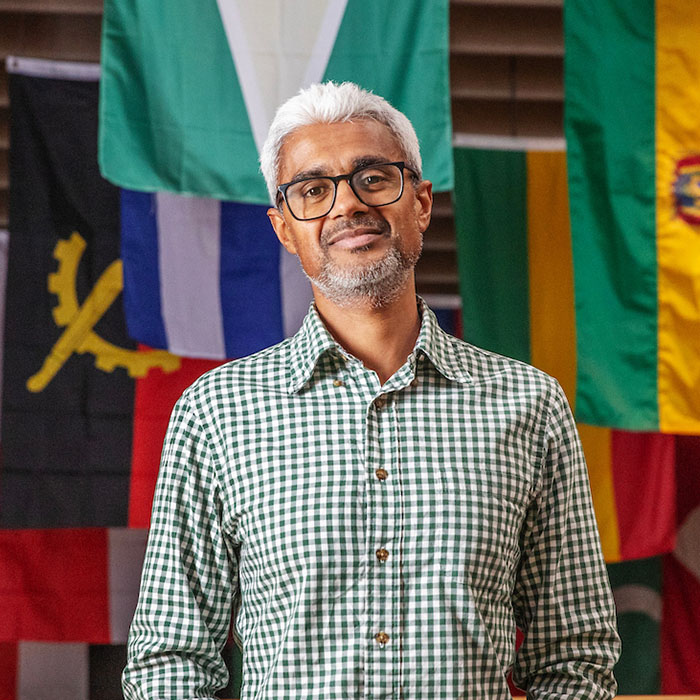Faculty at their best

Sharon Arpey shares a pre-class
laugh with John and AC Riley.
(Photo by Eric Jenks)
They come by car and bus from as far away as Vermont on Tuesdays and Thursdays for
seven weeks in the fall. All 350 are at least 55; many are much older.
They are not official Skidmore students, but they certainly enjoy the Skidmore experience.
They’re participants in the College’s hugely popular Mature Learners Lecture Series,
which has been packing Gannett Auditorium since the early 1980s.
In this year’s series, which concluded in mid-November, 21 Skidmore faculty members
gave 45-minute lectures in such areas as sports and society, environmentalism, global
and local politics, and history. They included the following:
- Tillman Nechtman, associate professor of history, on the mutiny on the Bounty, and especially what happened after Christian Fletcher set Captain Bligh adrift;
- Patrice Malatestinic, lecturer in music, on the history and mystery of the French horn;
- Peter von Allmen, professor and chair of economics, on the economics of baseball during World War II.
Ninety percent of each year’s participants have attended previously. “What keeps them
coming back is both camaraderie and the opportunity to hear Skidmore faculty at their
best, speaking on whatever ideas and concepts they themselves find most compelling,”
says Sharon Arpey, director of institutes, conferences and summer operations in the
Special Programs office.
Plus it’s a great deal. For those with incomes above $21,500, the fee is just $245,
which includes bus transportation if needed, morning coffee, lunches in Murray-Aikins
Dining Hall, and a final reception. For those with incomes less than $21,500, scholarships
are available.
Arpey has been closely involved with the program since its beginning. We asked her
a few questions.
Q: How did the program start?
“Mark Gelber, Skidmore’s first dean of special programs, secured funding for the mature-learners
series from the Schimper Foundation in the early 1980s. We had been highly successful
with a summer residential program for senior citizens coming to us from all over the
country—a program called "Elderhostel" at the time—but not so successful at drawing
local seniors. The grant enabled us to survey senior citizens in locally to find out
their needs. That research led us to come up with this model, which has been in place
ever since. I should note that Myles Cane, a trustee and board chair who did many
wonderful things for Skidmore, was of great help in obtaining the initial grant.”
Q: What was your initial involvement with the program, and how has it changed?
“For many years, I co-directed the program with a close colleague who has since retired.
We solicited the faculty’s participation, planned all the logistics, marketed the
program, registered the participants, and made sure things ran smoothly. As my responsibilities
have expanded over the years, I now have the expert assistance from a program coordinator
in my office to take care of these details, but I still interface directly with the
faculty and shape the lecture series each year. It’s one of my favorite activities—reading
the proposals from the faculty and then creatively weaving the talks together with
a thematic approach. Faculty from different disciplines, who might not normally work
together, bring interesting perspectives on a common subject.”

Participants in the Mature Learners
Lecture Series arrive in the
Palamountain/Dana lobby for pre-
lecture refreshments. (Photo by Eric
Jenks)
Q: How has the program evolved over the years?
“The program hasn’t changed much over the years because the model is a winner. The
faculty makes use of more technological teaching tools today. The demographics of
the participants also have changed. They reflect the fact that Saratoga Springs has
become a retirement destination. Many choose to settle here because of the proximity
to Skidmore College and all that we have to offer educationally and culturally. Participants
are much more sophisticated and educated than they used to be, and we see many more
men involved in today’s program.”
Q: How do faculty feel about participating?
“On the whole, faculty really enjoy working with this group. They find the participants
attentive and appreciative, and they often strike up relationships over e-mail or
welcome them into their regular classes as auditors. Because of the intense collaborative
research climate that has developed here at the College, faculty often invite student
colleagues to take part as co-presenters. Our participants seem fascinated with Skidmore’s
bright and talented students whenever they get the chance to interact with them.”
Q: What explains the loyalty of your following?
“People tell us regularly that the program is the highlight of their year. They look
forward to spending one day a week on campus listening to intellectually challenging
ideas and concepts while enjoying the camaraderie of each other’s company. The great
food in the dining hall may have some influence as well! For a number of participants,
it’s an opportunity to ‘test drive’ faculty before making the leap to auditing a class,
and they enjoy receiving suggestions for extra reading or resources for further exploration
of topics.”
Cover photo: Professor of Mathematics Dan Hurwitz gives a lecture on “Mathematics,
Music, and Knitting” for the Mature Learners Lecture Series. (Photo by Eric Jenks)
Posted On: 11/30/12


